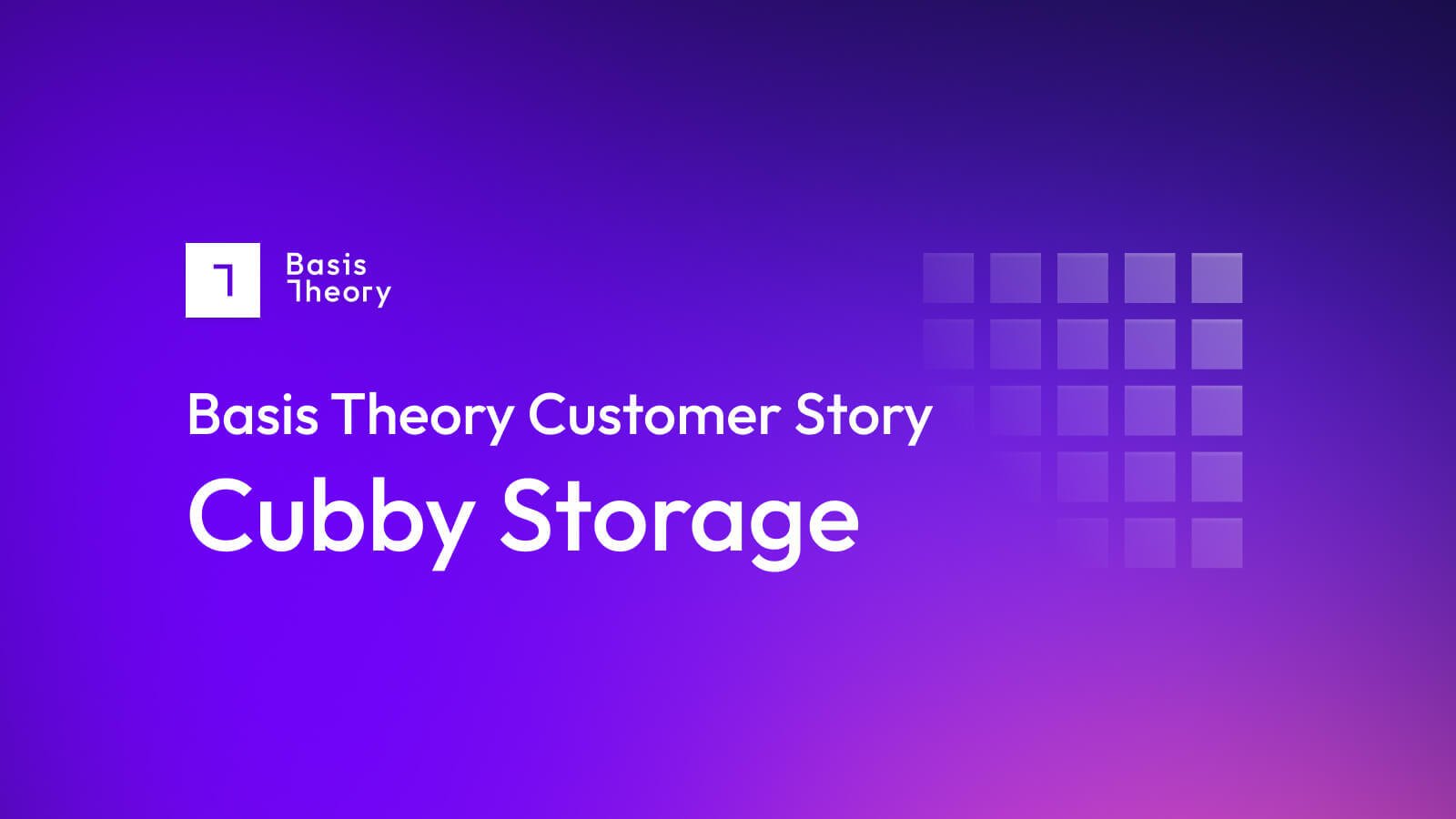Cubby Relocates to a New PSP Without the Headache by Using Basis Theory
1 Week
Integration Time
Simplified
PCI Compliance
Improved
Customer Experience
Key Insights
-
Improved Payment Acceptance Rates: Cubby addressed issues with stringent Address Verification System (AVS) requirements that previously led to payment rejections.
-
Enhanced Security and Compliance: Cubby securely handled sensitive customer information, reducing PCI compliance risks for self-storage operators who often lacked robust security measures.
-
Operational Flexibility: Implementing tokenization allowed Cubby to switch payment service providers (PSPs) without disruption.
-
Streamlined Tenant Experience: Cubby simplified the payment process for tenants, enabling seamless transactions without the need for repeated data entry.

Name
Website
Location
Industry
Features
- Proxy
- Basis Theory Elements

When people think of self storage, technology-forward isn’t the first thing that comes to mind. Traditionally, renting a storage unit can be arduous for the consumer, and inefficient for owners and operators. Cubby is changing all that.
Cubby, founded in 2021, offers software for self-storage owners and operators that allows these storage vendors to simplify payments - and make them more secure.
“We wanted to offer a SaaS product to self-storage owners and operators that allowed them to accept payments. And we wanted to do that in a way that would allow Cubby to benefit from the value we were creating in making those payments easy for the operator and tenant,” Adam Fleming, CTO of Cubby said.
Today, these vendors often store their customers’ sensitive information in databases, spreadsheets, or physical documents. Without strong security in place, this information could be easily compromised.
“Self storage operators often do not have strong risk and compliance controls in place, and many are carrying significant unnecessary PCI risk,” he mentioned.
The Challenge: Simplifying Payments is…Not Simple
Self-storage companies facilitate payments for several transaction types: retail point of sale merchandise, recurring rent payments, balance billing for moving charges, and third-party payment for insurance.
“It's actually very complicated, and we want the tenant experience to be much simpler: the person behind the counter should swipe the card or use contactless payment for the initial move-in payment, and the tenant should never have to provide that information again.”
But Adam found that working with payment processors can be challenging. With constant mergers and acquisitions in the space, as well as ever-evolving PCI compliance standards, it was difficult to decipher which combination of technologies were needed for Cubby to solve this payments problem.
However, Adam researched and found a payment processor that he believed would meet the startup’s evolving needs as the company grew. After taking the advice of this payment processor and using the solution they offered him, Cubby was ready to launch with its first customer.
At go-live the team was surprised to see poor payment acceptance rates from their payment processor, which ultimately led to a poor customer and operator experience.
This is because Cubby's payment processing partner required an onerous AVS (address-based verification) match. Considering that relocation is a primary driver of self storage use, stringent AVS requirements were causing (and would continue to cause) many payments to be rejected.
“People rent storage units in times of tremendous life change. And as you can imagine, most people are actually moving when they use a self-storage unit.” Therefore, the person may have a temporary mailing address and requiring an AVS match would continue to cause transactions to fail.
It became clear that this payment processor wasn’t going to provide the user experience Cubby needed.
Uncovering the Need for Tokenization
Adam wanted to work with a processor that would better support the self storage business and ultimately Cubby’s goals. This was a high-stakes decision, as changing PSPs again would prove tremendously painful for the Cubby team, its customers, and its customers’ tenants.
Adam had to figure out something else that could work instead. In researching, he learned about one-way tokens as a potential solution from a representative at a PSP. However, using those tokens would create vendor lock-in and Adam was nervous about committing to something so pivotal to the process at such an early stage.
But, this got Adam thinking: “I came to the realization that Cubby needs to be in control of on-file credit card numbers. The only way that we could do that is with a third-party tokenization provider who would tokenize the card numbers for the exclusive benefit of Cubby and our customers.”
Finding Basis Theory
Adam had strict criteria when looking for a new third-party tokenization provider.
This partner needed to provide:
- Ability to change PSPs without having to collect new credit card details for cards-on-file
- A sustainable price point that allowed Cubby to grow and scale
- Great support and quick answers without having to get on a sales call
- Built-in PCI compliance Adam and his team didn’t even need to think about
With some additional searching, Adam found Basis Theory.
“When I found Basis Theory, I joined the Slack channel and began messaging the Basis Theory team. Within five minutes I was able to get real answers to important questions about how Basis Theory worked, and I realized that Basis Theory would be an amazing partner.” Adam said.
Many tokenization providers offered difficult-to-decipher pricing models, and it required significant effort to determine the real cost of tokenization. Adam just wanted an answer about pricing upfront - and quickly. “That’s why I joined the Slack channel. The speed with which I was able to get the answer convinced me that Basis Theory was going to work.”
Adam built a POC with another third-party tokenization platform but the price of tokens was going to be too expensive for the fledgling startup, with tokenization costs consuming a significant portion of the company’s revenue. For a growing company, the ability to “pay as you go” and choose a provider that would grow with the company was pivotal.
Adam also mentioned that Basis Theory’s developer documentation was exceptional, which assisted in the ability to go live quickly.
“Cubby implemented a tokenization and payment processing POC using Basis Theory in days, and we went live within a week. The quality of the Basis Theory product, time to market, and ultimately ROI are unquestionably market-leading.”
.png?width=365&height=122&name=BTLogo%20(1).png)


